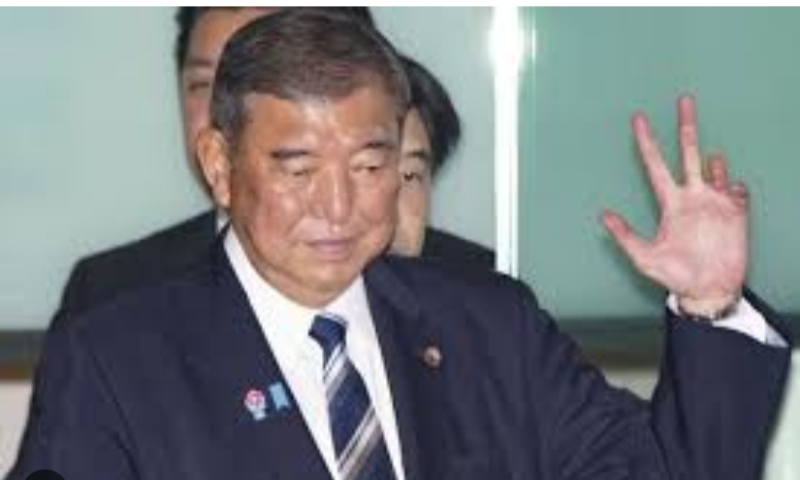World
Japan’s Prime Minister, Ishiba, resigns

Japanese Prime Minister, Shigeru Ishiba, announced his resignation on Sunday, bowing out after a string of electoral defeats and just days after completing a hard-fought trade pact with the United States.
His departure opens the door to a potentially uncertain political transition for the world’s fourth-largest economy.
Ishiba, 68, told reporters that he could not remain in office following his ruling coalition’s repeated election losses. “With Japan having signed the trade agreement and the president having signed the executive order, we have passed a key hurdle,” he said, his voice wavering. “I would like to pass the baton to the next generation.”
Since taking office less than a year ago, Ishiba’s government has seen voter frustration over rising living costs translate into the loss of its majority in both houses of parliament. Calls for him to step aside intensified after July’s upper house defeat.
The Liberal Democratic Party (LDP), which has dominated Japanese politics for most of the postwar period, will now hold an emergency leadership contest. Ishiba confirmed he will remain in office until a successor is chosen.
Markets reacted nervously last week, with Japan’s yen and government bonds coming under pressure as investors weighed the possibility of a change in economic direction.
Attention has turned to potential contenders to succeed Ishiba. Sanae Takaichi, a party veteran known for supporting expansive fiscal measures and opposing sharp interest rate hikes, is considered a frontrunner. She narrowly lost to Ishiba in last year’s LDP leadership race. Another high-profile candidate is Shinjiro Koizumi, the charismatic farm minister who has gained visibility while trying to rein in food prices.
READ ALSO:Japan breaks silence over rumoured plans to create special visas for Nigerians
“Given the political pressure mounting on Ishiba after the LDP’s repeated election losses, his resignation was inevitable,” said Kazutaka Maeda, economist at Meiji Yasuda Research Institute.
“As for potential successors, Koizumi and Takaichi are seen as the most likely candidates. While Koizumi is not expected to bring major changes, Takaichi’s stance on expansionary fiscal policy and her cautious approach to interest rate hikes could draw scrutiny from financial markets,” Maeda said.
Since the ruling coalition has lost its parliamentary majority, the next LDP president is not guaranteed to become prime minister, although that is likely as the party remains by far the largest in the lower house.
Whoever becomes the next leader may choose to call a snap election to seek a mandate, analysts said. While Japan’s opposition remains fractured, the far-right, anti-immigration Sanseito party made big gains in July’s upper house election, bringing once-fringe ideas into the political mainstream.
Nearly 55% of respondents to a poll by Kyodo news agency published on Sunday said there was no need to hold an early election.
Michael Brown, senior research strategist at financial markets brokerage Pepperstone, said there was likely to be further selling pressure on the yen and long-dated bonds on Monday.
“That selling pressure is likely to come first from the market now needing to price a greater degree of political risk, not only in terms of the LDP leadership contest, but also the potential for a general election to be held if the new leader seeks a mandate of their own,” Brown said.
Ishiba, a party outsider who became leader on his fifth attempt last September, wrapped up his brief tenure by completing the trade deal with Japan’s biggest trading partner, pledging $550 billion of investments in return for lower tariffs.
Trump’s tariffs, especially those targeted at Japan’s critical automotive sector, had forced Japan to downgrade its already weak growth outlook for the year.
Ishiba said he hoped his successor could ensure the deal is executed and Japan continues generating wage gains to assuage voter concerns over living costs.
He also expressed concern about the security environment his successor will inherit, pointing to an unprecedented gathering of Chinese, Russian and North Korean leaders in Beijing for a massive military parade last week.
Yoshinobu Tsutsui, chairman of Japan’s biggest business lobby, Keidanren, said there was “no time to lose” with mounting domestic and international challenges.
“We hope the new leader will foster unity within the party, establish stable political conditions, and move swiftly to implement necessary policies,” Tsutsui said.
Some voters too are hoping for a steady hand in uncertain times.
“With all the turmoil around tariffs right now, I hope the next prime minister will be someone who can properly manage the tariff issues and handle diplomacy more effectively,” Maki Utsuno, a 48-year-old chemistry researcher, told Reuters outside a busy train station in downtown Tokyo on Sunday.
(REUTERS)






















